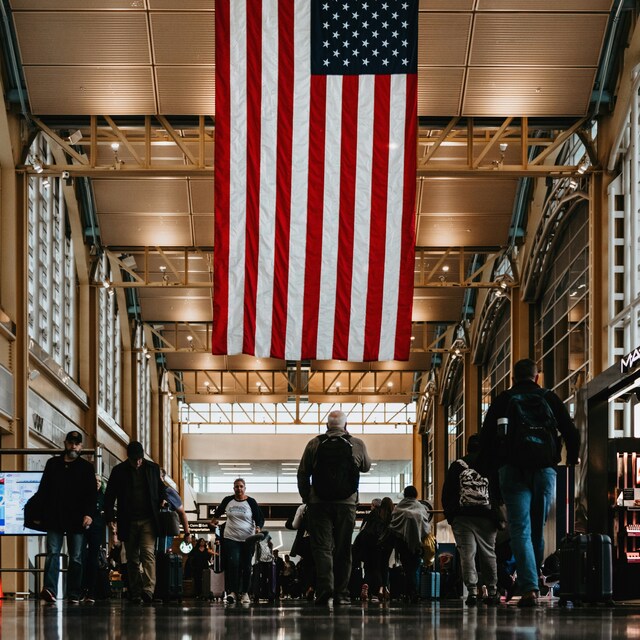Veterans face unique challenges when it comes to accessing healthcare services, and transportation can be a significant barrier. Recognizing this issue, the Department of Veterans Affairs (VA) and various non-profit organizations have developed comprehensive transportation benefits to ensure veterans can attend their medical appointments without worry.
Veteran transportation benefits encompass a range of services designed to help former service members get to and from VA medical facilities and authorized non-VA healthcare appointments. These benefits can include free rides, reimbursement for travel expenses, and specialized transportation options for those with specific needs.
Understanding these benefits is crucial for veterans to take full advantage of the healthcare services they’ve earned through their service. Whether you’re a veteran living in a rural area, dealing with mobility issues, or simply needing assistance with transportation, these are the programs available to help you access the care you need.
Types of Transportation Programs Available
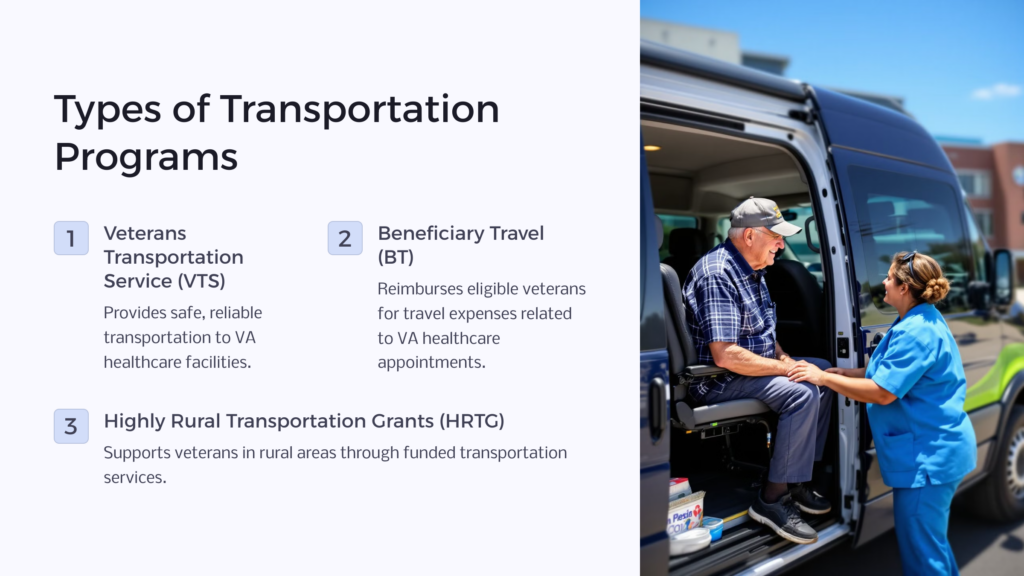
The VA offers several transportation programs to meet the diverse needs of veterans across the country. One of the primary services is the Veterans Transportation Program (VTP), which includes multiple services to ensure comprehensive coverage. These services include:
- Veterans Transportation Service (VTS): This program provides safe and reliable transportation for veterans to and from VA healthcare facilities. VTS uses a network of vehicles and partners with local transportation providers to offer flexible options for veterans.
- Beneficiary Travel (BT): This service reimburses eligible veterans for their travel expenses related to VA healthcare appointments. It can cover mileage, public transportation costs, and in some cases, specialized modes of transport.
- Highly Rural Transportation Grants (HRTG): These grants support veterans in rural areas by funding transportation services provided by Veterans Service Organizations and State Veterans Service Agencies.
Additionally, non-profit organizations like the Disabled American Veterans (DAV) operate their own transportation networks. The DAV runs a fleet of vehicles nationwide, offering free rides to medical appointments for injured and ill veterans.
Eligibility Criteria for Transportation Benefits
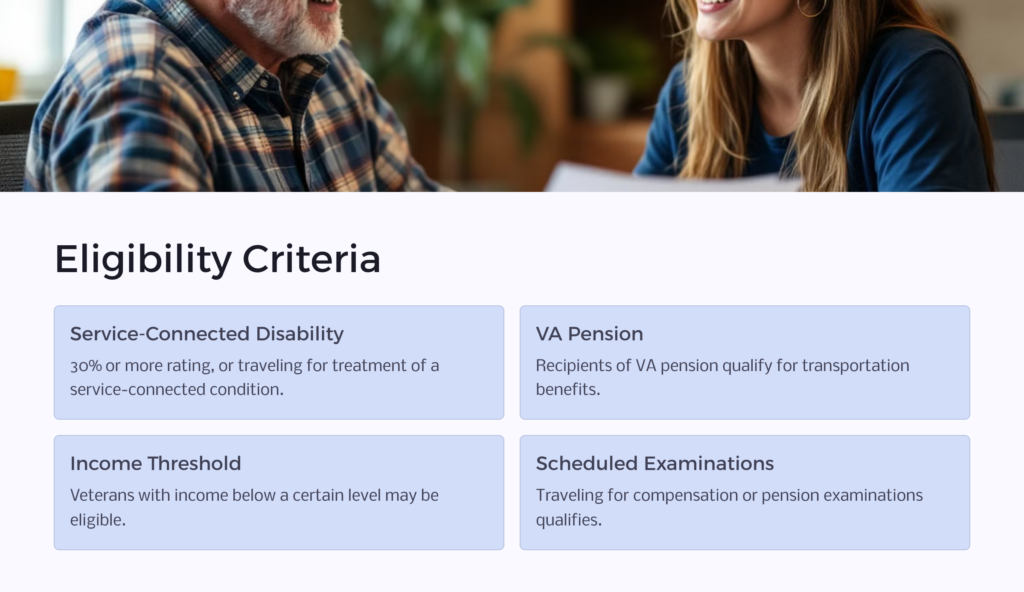
Eligibility for veteran transportation benefits varies depending on the specific program and the veteran’s circumstances. Generally, veterans must be enrolled in VA healthcare and have appointments at VA facilities or authorized non-VA locations to qualify for transportation services.
For the Beneficiary Travel program, veterans typically need to meet one of the following criteria:
- Have a service-connected disability rating of 30% or more
- Be traveling for treatment of a service-connected condition
- Receive a VA pension
- Have an income below a certain threshold
- Be traveling for a scheduled compensation or pension examination
The Highly Rural Transportation Grants program focuses on veterans living in counties with fewer than seven people per square mile, addressing the unique challenges faced by veterans in remote areas.
It’s important to note that eligibility requirements can change, and some local VA facilities may have additional criteria or services. Veterans are encouraged to check with their local VA office or transportation coordinator for the most up-to-date information on their eligibility.
How to Access VA Transportation Services
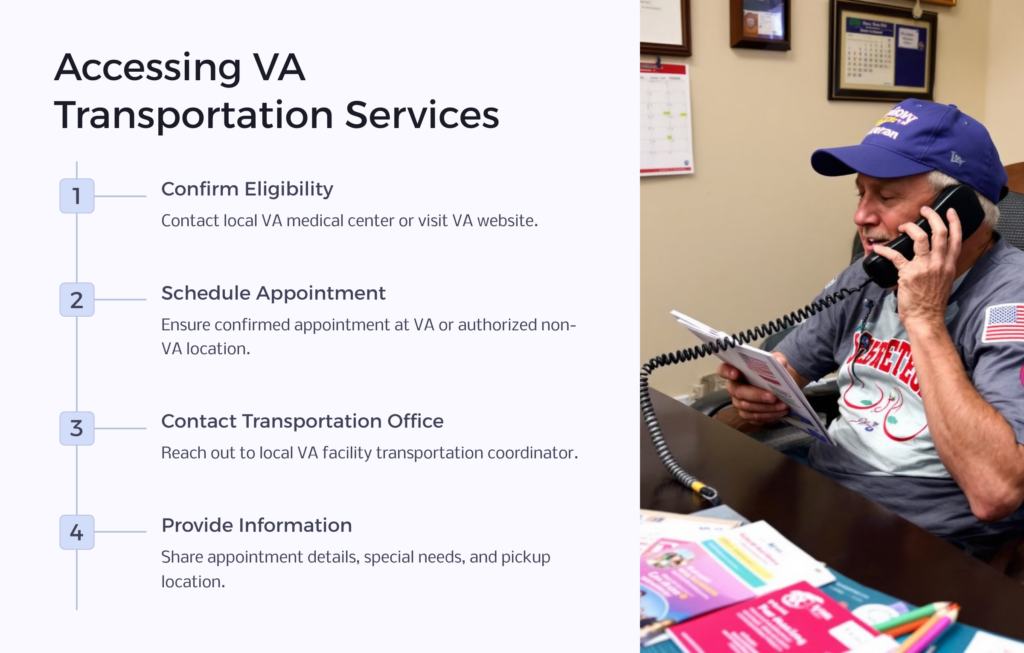
Accessing VA transportation services is designed to be straightforward, but it may require some planning ahead. Here’s a step-by-step guide to help you navigate the process:
- Confirm your eligibility: Contact your local VA medical center or visit the VA’s website to verify that you qualify for transportation benefits.
- Schedule your medical appointment: Make sure you have a confirmed appointment at a VA facility or an authorized non-VA location.
- Contact the VA transportation office: Reach out to the transportation coordinator at your local VA facility. They can provide information on available services and help you schedule a ride if needed.
- For DAV transportation: If you’re using the DAV’s transportation network, consult their Hospital Service Coordinator Directory to find contact information for your area.
- Provide necessary information: Be prepared to share details about your appointment, any special needs you may have, and your pickup location.
Remember to request transportation services as far in advance as possible, as availability can be limited, especially in rural areas. If you’re using the Beneficiary Travel program for reimbursement, keep all receipts and documentation related to your travel expenses.
The Role of Non-Profit Organizations in Veteran Transportation
Non-profit organizations play a crucial role in filling gaps and enhancing the transportation services available to veterans. These organizations often work in partnership with the VA to ensure comprehensive coverage and support for veterans’ transportation needs.
The Disabled American Veterans (DAV) is a standout example of a non-profit making a significant impact. The DAV operates a nationwide transportation network, providing free rides to medical appointments for injured and ill veterans. This service is particularly valuable for veterans who live in areas with limited public transportation or who have mobility issues that make independent travel challenging.
Other organizations, such as Veterans of Foreign Wars (VFW) and the American Legion, may also offer local transportation assistance or volunteer driver programs. These grassroots efforts are often tailored to meet the specific needs of veterans in their communities.
Non-profits also contribute by:
- Advocating for improved transportation services and policies
- Raising awareness about available benefits
- Providing volunteers to support transportation programs
- Offering additional support services to complement transportation assistance
Veterans are encouraged to explore both VA and non-profit resources in their area to find the best transportation solutions for their needs.
Reimbursement Options for Veteran Travel
For veterans who can travel independently but need financial assistance, the VA’s Beneficiary Travel program offers reimbursement options. This program helps offset the costs associated with traveling to medical appointments, making it easier for veterans to access the care they need.
Key points about travel reimbursement include:
- Mileage reimbursement: Veterans can receive a per-mile payment for travel by private vehicle.
- Public transportation: Costs for bus, train, taxi, or airplane tickets may be covered when necessary.
- Meals and lodging: In some cases, expenses for meals and overnight stays related to medical appointments may be reimbursed.
To claim reimbursement, veterans typically need to file a travel claim at the VA facility on the same day as their appointment. Some locations may offer electronic filing options for convenience.
It’s important to keep all receipts and documentation related to travel expenses. The VA may require this information to process reimbursement claims accurately and efficiently.
Highly Rural Transportation Grants Explained
The Highly Rural Transportation Grants (HRTG) program is a specialized initiative designed to address the unique transportation challenges faced by veterans living in remote areas. This program recognizes that veterans in highly rural counties often have to travel long distances to reach VA medical facilities, which can be a significant barrier to accessing care.
Key features of the HRTG program include:
- Grants awarded to Veterans Service Organizations and State Veterans Service Agencies
- Focus on counties with fewer than seven people per square mile
- Funding for innovative transportation solutions tailored to rural communities
These grants enable organizations to provide free transportation services to veterans in eligible areas, helping to ensure that even those in the most remote locations can access their VA healthcare benefits.
The HRTG program not only improves access to medical care but also helps to reduce isolation and improve overall quality of life for rural veterans. By supporting these grants, the VA demonstrates its commitment to serving all veterans, regardless of their geographic location.
Veterans Transportation and Community Living Initiative
The Veterans Transportation and Community Living Initiative (VTCLI) is a federal program that aims to improve transportation options for veterans, military families, and other community members. While not exclusively for medical transportation, this initiative plays a crucial role in enhancing overall mobility for veterans.
VTCLI focuses on:
- Creating or expanding One-Call/One-Click Transportation Resource Centers
- Improving coordination between different transportation providers
- Leveraging technology to enhance transportation services
This program recognizes that veterans’ transportation needs extend beyond medical appointments and seeks to create comprehensive solutions that improve overall quality of life. By fostering partnerships between transit agencies, veterans’ organizations, and community services, VTCLI helps create more integrated and efficient transportation networks.
Veterans benefit from VTCLI through improved access to job opportunities, educational resources, and community services, in addition to healthcare facilities. This holistic approach to transportation supports veterans in all aspects of their civilian lives.
Special Modes of Transportation and Rates
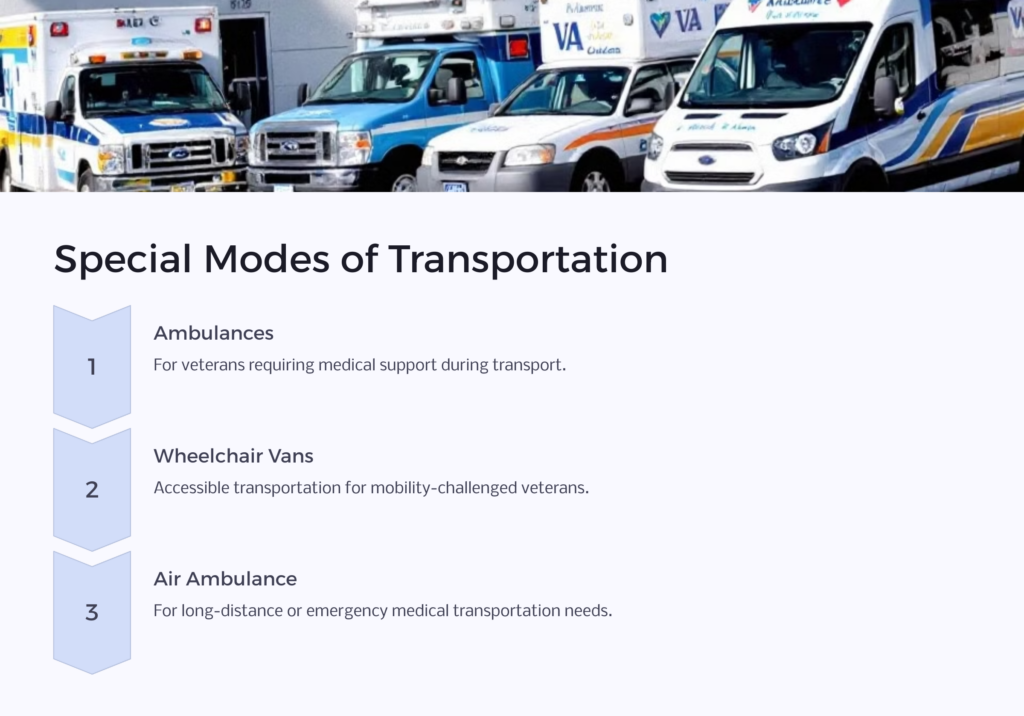
For veterans with specific medical needs or mobility challenges, the VA provides special modes of transportation (SMT) services. These options ensure that veterans with more complex transportation requirements can safely and comfortably attend their medical appointments.
Special modes of transportation may include:
- Ambulances
- Wheelchair vans
- Air ambulance services
- Contracted transportation providers with specialized equipment
The VA recently updated its policy regarding rates for special modes of transportation, particularly for air ambulance services. The new regulation aims to align VA payments with industry standards while ensuring veterans continue to receive necessary services.
Key points about the new policy include:
- VA will pay the lesser one of either the actual charge or the standard Medicare rate for air ambulance services
- Local VA medical centers may establish separate rates based on contracts with air ambulance providers
- The changes are designed to be more cost-effective while maintaining quality of service
Veterans who require special modes of transportation should discuss their needs with their VA healthcare provider or transportation coordinator to ensure appropriate arrangements are made.
Tips for Accessing Transportation Assistance
Navigating the various transportation benefits and programs can sometimes be challenging. Here are additional tips to help veterans make the most of the available transportation assistance:
- Plan ahead: Schedule your transportation needs as far in advance as possible, especially if you require special accommodations.
- Know your options: Familiarize yourself with all the transportation programs available in your area, including both VA and non-profit services.
- Keep documentation: Maintain a file with all your travel-related receipts, appointment confirmations, and eligibility information.
- Communicate clearly: When requesting transportation, be sure to explain any special needs or requirements you may have.
- Explore local resources: Check with your county veterans service officer or local veterans organizations for additional transportation options or assistance.
- Use technology: Look for apps or online portals that can help you schedule rides or track reimbursements more efficiently.
- Provide feedback: If you encounter issues or have suggestions for improvement, share your feedback with the VA or service provider. Your input can help enhance services for all veterans.
Remember, the goal of these programs is to ensure you can access the care you need. Don’t hesitate to ask questions or seek assistance if you’re unsure about any aspect of veteran transportation benefits.
Resources for Further Support
For veterans seeking more information or assistance with transportation benefits, there are numerous resources available:
- VA Health Benefits website: Offers comprehensive information on VA healthcare services, including transportation benefits.
- DAV Transportation Network: Provides details on the DAV’s free transportation services for veterans.
- National Resource Directory: A comprehensive database of resources for veterans, including transportation services.
- Veterans Transportation Service locator: Helps veterans find VTS services in their area.
- Local VA Medical Centers: Contact your nearest VA facility for specific information about transportation services in your region.
- Veterans Service Organizations (VSOs): Organizations like the American Legion, VFW, and others often have local chapters that can provide assistance or information.
- VA’s Caregiver Support Program: Offers resources for caregivers who may be assisting veterans with transportation needs.
Don’t hesitate to reach out to these resources for help. The veteran community and support organizations are committed to ensuring that transportation is not a barrier to receiving the care and benefits you’ve earned through your service. Benefits.com is here to help you understand your eligibility and secure the benefits you deserve. To learn more, take our Benefits Quiz and find other benefits you may qualify for.
 Benefits.com Advisors
Benefits.com Advisors
With expertise spanning local, state, and federal benefit programs, our team is dedicated to guiding individuals towards the perfect program tailored to their unique circumstances.
Rise to the top with Peak Benefits!
Join our Peak Benefits Newsletter for the latest news, resources, and offers on all things government benefits.















